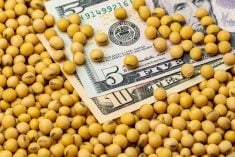Chicago | Reuters — U.S. lean hog futures dropped to their lowest prices in more than a week on Friday as a Chinese agriculture delegation scrapped U.S. farm visits planned to build goodwill during trade talks next week.
The canceled trips to Montana and Nebraska raised concerns that the U.S.-China trade war may drag on even longer, traders said. The Montana Farm Bureau said the delegates will return to China sooner than originally scheduled.
Read Also

U.S. grains: Soy futures post biggest monthly gain in nearly five years on China trade optimism
U.S. soybean futures climbed to a 15-month high and posted their biggest monthly gain in nearly five years on Friday following a rally fueled by the prospect of revived exports to China.
The year-long trade dispute has slowed exports of U.S. farm products including pork to China, as Beijing and Washington have imposed retaliatory tariffs on billions of dollars worth of each others’ products.
Markets ranging from soybeans and cattle to equities also came under pressure from news of the cancellations, analysts said, one day after the U.S. Department of Agriculture (USDA) announced China’s planned visits.
“This Chinese delegation walking, it’s hurting everybody,” said Karl Setzer, commodity risk analyst for Agrivisor.
October lean hog futures touched their lowest price since Sept. 11 before ending down 1.05 cents at 60.35 cents/lb. at the Chicago Mercantile Exchange (all figures US$). December lean hog futures slid 1.7 cents to 66.25 cents/lb.
October live cattle futures fell 0.45 cent to 99.35 cents/lb.
October feeder cattle futures managed to close higher, supported by firmer cash cattle prices. The contract reached its highest price since Aug. 8 and closed up 0.275 cent at 139.2 cents/lb.
After the close of trading, USDA said in a monthly report that 1.88 million head of cattle were placed in feedlots in August, nine per cent less than a year earlier. Analysts surveyed by Reuters were expecting a decline of about 6.3 per cent.
The bigger-than-expected drop signals that cattle supplies in the first quarter of 2020 will be equal to or smaller than a year earlier, said Rich Nelson, chief strategist for broker Allendale. The data should help underpin cattle futures on Monday, he said.
“It continues the story that our coming first-quarter beef supply is going to be much tighter than the market is currently implying,” Nelson said.
— Reporting for Reuters by Tom Polansek in Chicago.











